The following are selected major events in the 24-day student-led protest occupying the Legislative Yuan, dubbed the Sunflower movement, that began March 18 and ended yesterday:
March 17
In a chaotic joint session of eight committees of the Legislative Yuan and a mere 30 seconds into the review of the cross-strait service trade pact, Chinese Nationalist Party (KMT) Legislator Chang Ching-chung (張慶忠), announced that the review was over and that the agreement would be submitted to the legislature. The move triggered an angry response from student activists and civic groups, as well as the opposition parties.
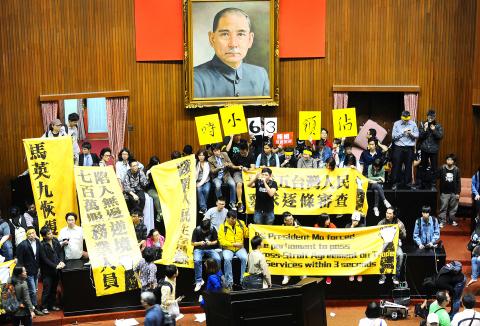
Photo: Chang Chia-ming, Taipei Times
March 18
The Democratic Front Against The Cross-Strait Trade in Services Agreement held an evening rally outside the Legislative Yuan, which turned into a storming of the legislature by hundreds of student protesters. Using swivel chairs and other furniture, they sequestered themselves in the main legislative chamber, where overnight police attempts to evict them were unsuccessful.
Hundreds of people — also mainly students — who supported the occupation gathered outside the legislative compound. The protesters’ demands included Premier Jiang Yi-huah’s (江宜樺) resignation, an apology from President Ma Ying-jeou (馬英九) and a return of the service trade pact to an item-by-item review by the legislative committees.
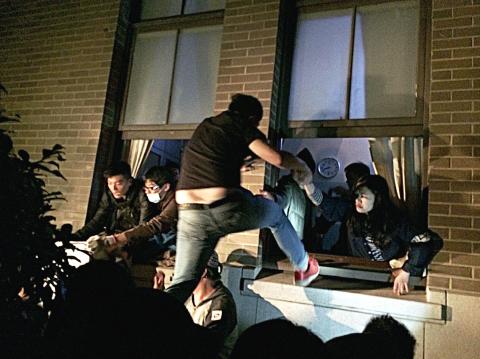
Photo: CNA
March 21
Ma called a meeting with Vice President Wu Den-yih (吳敦義), Jiang and Legislative Speaker Wang Jin-pyng (王金平) in a bid to end the confrontation, but it was canceled after Wang excused himself, saying in a letter that the nature of the dispute is different from one that would require the intervention of the head of state.
March 22
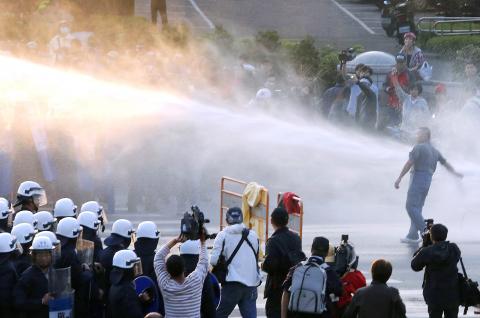
Photo: Reuters
Jiang became the first ranking administration official to see the protesters.
He was met outside the Legislative Yuan by National Taiwan University graduate student Lin Fei-fan (林飛帆) and other student leaders, who demanded that, for a dialogue to happen, the premier should promise first to withdraw the service trade pact from the legislature and to enact a new law aimed at providing close scrutiny of all agreements with China.
The brief encounter broke up after Jiang rejected the setting of preconditions for a dialogue.
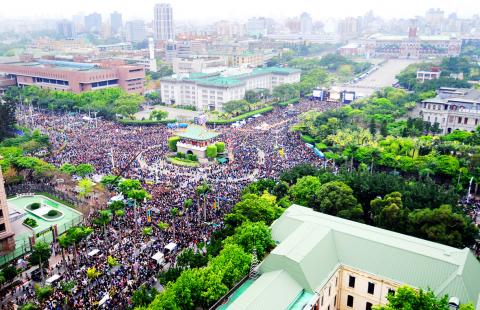
Photo: Lo Pei-der, Taipei Times
March 23
Ma called an international press conference, in which he stressed the importance of the cross-strait service trade agreement to Taiwan’s economy and its efforts to avoid marginalization. In response, the student-led movement said the president did not show any sincerity in having a dialogue with the protesters.
The students issued four demands: a civic conference on constitutional government, legalization of the mechanism for monitoring cross-strait agreements, no action on the service trade pact until the new oversight law is enacted and a pledge by all legislators to work on the new legislation first.
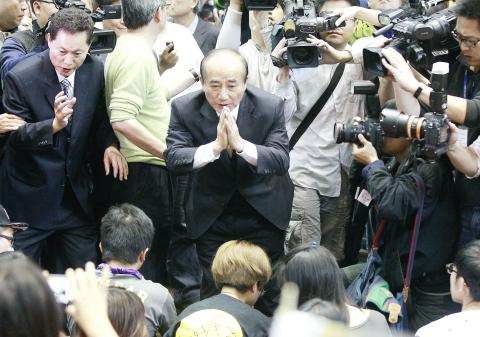
Photo: Pichi Chuang, Reuters
In the evening, hundreds of protesters broke into the Executive Yuan compound, which is about 200m from the Legislative Yuan.
As police prepared to evict the intruders, a few politicians of the Democratic Progressive Party (DPP) went to the site to support the activists. They included current and former party bosses Su Tseng-chang (蘇貞昌), Tsai Ing-wen (蔡英文) and Frank Hsieh (謝長廷).
After police reinforcements arrived, law enforcement began forcibly removing the activists after midnight, including the use of water cannons.
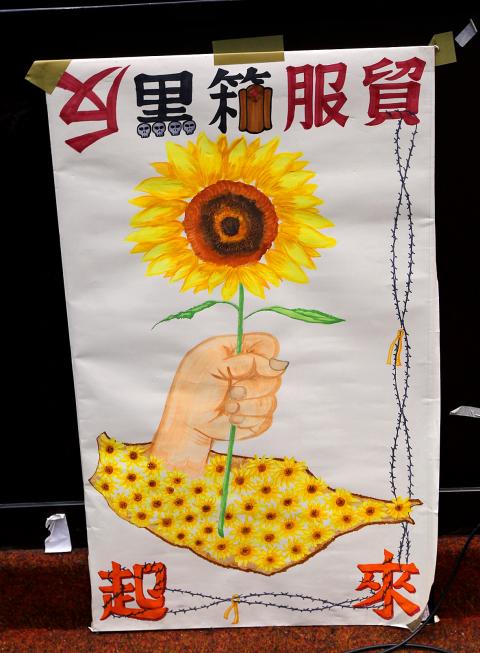
Photo: Chen Kuan-pei, Taipei Times
More than 200 people, including protesters and officers, were injured.
The compound was cleared of demonstrators by daybreak. Protesters alleged police brutality and “state violence.”
However, government officials said the police had exercised a high degree of self-restraint.
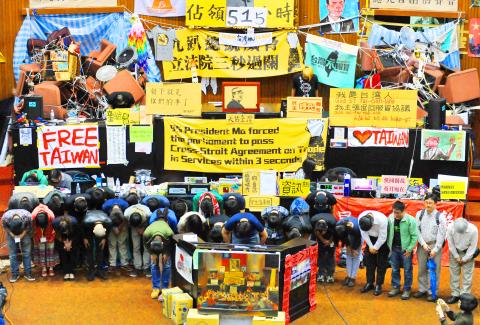
PHOTO: AFP
March 24
For the first time, Wang called on leaders of several legislative caucuses for consultations. Several more rounds of talks took place at his residence, but all broke down as senior lawmakers of the majority and opposition parties could not agree on how to handle the service trade pact.
The KMT caucus later agreed to have the pact returned to the committee stage for a detailed review, but no consensus could be reached in the consultations called by the speaker.
March 25
The president said through a spokesperson that he was willing to hold a dialogue with the students without any preconditions in order to resolve the dispute.
March 27
The student-led occupation movement called on the public to attend a rally in front of the Presidential Office Building set for March 30.
March 28
For the first time, the premier said the administration is open to the possibility of legalizing the mechanism for the oversight of all cross-strait agreements. At the same time, he rejected the students’ demand that the service trade agreement be withdrawn from the legislature.
March 29
The president held a second press conference to explain the administration’s position on the dispute.
March 30
A peaceful rally of demonstrators dressed in black took place on Ketagalan Boulevard in front of the Presidential Office Building. Organizers said as many as 500,000 took part in the event.
Police said the number was 116,000 at its peak.
March 31
KMT legislator Chang and Lin Hung-chih (林鴻池), chief whip of the KMT legislative caucus, apologized for the social turmoil following their action on March 17.
April 1
The China Unification Promotion Party, founded by former leader of the Bamboo Union gang “White Wolf” Chang An-le (張安樂), and some labor groups supportive of the service trade pact marched on the Legislative Yuan and demanded that the authorities take action against the student-led occupation of the legislative chamber. Once there, they confronted the protesters and some DPP politicians. Police struggled to separate the two opposing camps.
April 3
In a weekly meeting, the Executive Yuan approved a draft bill aimed at increasing the oversight of cross-strait agreements.
Protest leader Chen Wei-ting (陳為廷), a graduate student at National Tsing Hua University, rejected the text of the bill as “mere form.”
As many as 10 alternate versions of the proposed legislation were being discussed by the students.
April 6
Wang returned to the Legislative Yuan for the first time since March 18 after declaring that he would not call any cross-party caucus meetings on the service trade pact until the new oversight law has been enacted.
Once in the main chamber, he shook hands with Lin and urged all students to go home.
April 7
The student leaders said they would evacuate the legislative chamber at 6pm yesterday.
Source: CNA

Taiwan has received more than US$70 million in royalties as of the end of last year from developing the F-16V jet as countries worldwide purchase or upgrade to this popular model, government and military officials said on Saturday. Taiwan funded the development of the F-16V jet and ended up the sole investor as other countries withdrew from the program. Now the F-16V is increasingly popular and countries must pay Taiwan a percentage in royalties when they purchase new F-16V aircraft or upgrade older F-16 models. The next five years are expected to be the peak for these royalties, with Taiwan potentially earning

STAY IN YOUR LANE: As the US and Israel attack Iran, the ministry has warned China not to overstep by including Taiwanese citizens in its evacuation orders The Ministry of Foreign Affairs (MOFA) yesterday rebuked a statement by China’s embassy in Israel that it would evacuate Taiwanese holders of Chinese travel documents from Israel amid the latter’s escalating conflict with Iran. Tensions have risen across the Middle East in the wake of US and Israeli airstrikes on Iran beginning Saturday. China subsequently issued an evacuation notice for its citizens. In a news release, the Chinese embassy in Israel said holders of “Taiwan compatriot permits (台胞證)” issued to Taiwanese nationals by Chinese authorities for travel to China — could register for evacuation to Egypt. In Taipei, the ministry yesterday said Taiwan

Taiwan is awaiting official notification from the US regarding the status of the Agreement on Reciprocal Trade (ART) after the US Supreme Court ruled US President Donald Trump's global tariffs unconstitutional. Speaking to reporters before a legislative hearing today, Premier Cho Jung-tai (卓榮泰) said that Taiwan's negotiation team remains focused on ensuring that the bilateral trade deal remains intact despite the legal challenge to Trump's tariff policy. "The US has pledged to notify its trade partners once the subsequent administrative and legal processes are finalized, and that certainly includes Taiwan," Cho said when asked about opposition parties’ doubts that the ART was

If China chose to invade Taiwan tomorrow, it would only have to sever three undersea fiber-optic cable clusters to cause a data blackout, Jason Hsu (許毓仁), a senior fellow at the Hudson Institute and former Chinese Nationalist Party (KMT) legislator, told a US security panel yesterday. In a Taiwan contingency, cable disruption would be one of the earliest preinvasion actions and the signal that escalation had begun, he said, adding that Taiwan’s current cable repair capabilities are insufficient. The US-China Economic and Security Review Commission (USCC) yesterday held a hearing on US-China Competition Under the Sea, with Hsu speaking on